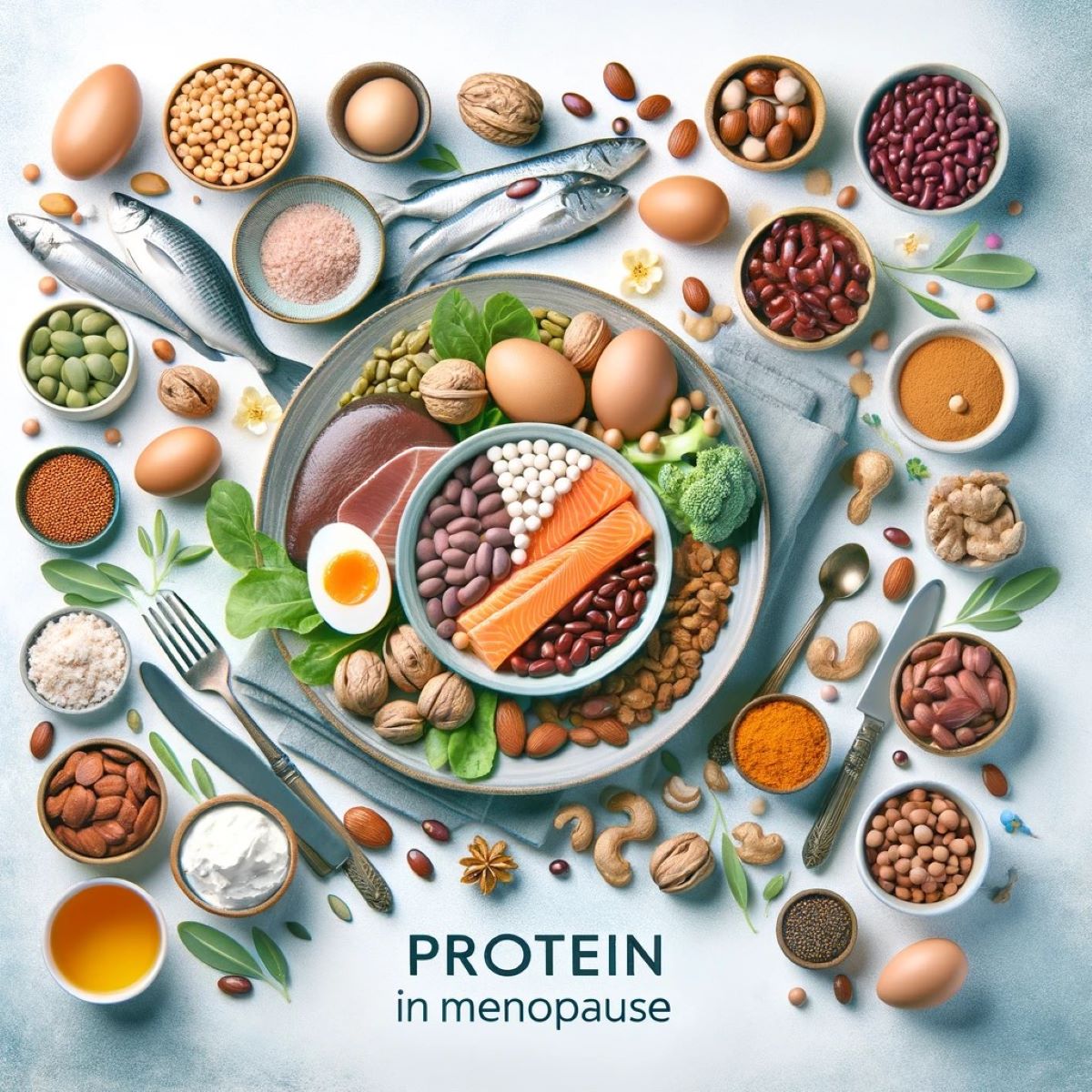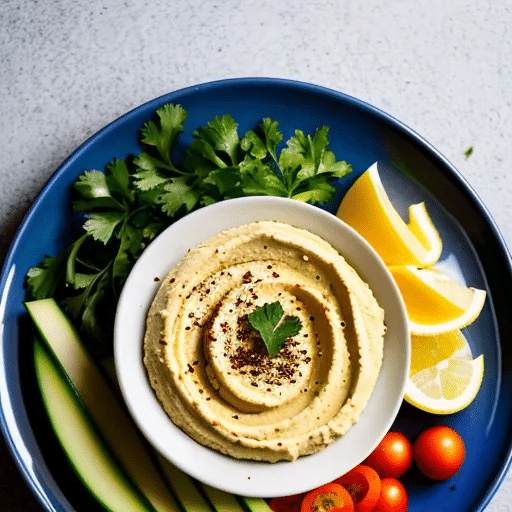Protein in Menopause: Getting It Right Without the Hype
It's almost impossibe to avoid conversations about protein in the nutrition world these days. It's EVERYWHERE.
But when you're in the thick of menopause, it’s easy to feel overwhelmed by all the advice flying around. Should you be tracking grams? Eating protein at every meal? Switching to powders?
Let’s cut through the noise.
As hormone levels shift, your body starts to lose muscle more easily, your bones need extra support, and your metabolism can feel like it’s slowing to a crawl. Getting enough protein won’t fix everything, but it can make a meaningful difference in how you feel and function.
This post breaks down exactly how much protein you need during menopause, when to eat it, and what kinds are worth focusing on—no fads or fluff. Just practical guidance to help you stay strong, energized, and well-fed during this next chapter.
What is Protein?

Protein is a key nutrient made up of smaller parts called amino acids, which are like building blocks for your body.
It's found in foods like meat, beans/legumes, nuts, and dairy.
Protein plays a key role in maintaining muscle, supporting bone strength, and helping regulate things like blood sugar. But as we get older, our bodies aren’t as efficient at turning protein into muscle. That means getting enough becomes even more important in midlife—especially during and after menopause.
Why is Protein important in Menopause?

Protein plays a vital role during menopause for several reasons:
Muscle Loss: As women age—especially during and after menopause—they naturally experience a decline in muscle mass, a condition known as sarcopenia. Protein plays a crucial role in maintaining and repairing muscle tissue.
Getting enough protein can help slow this muscle loss, supporting strength, mobility, and overall vitality as you age.
Bone Health: Due to our hormonal changes, we tend to lose bone mass as well. This increases our the risk for osteoporosis. Protein is a major component of bone and is essential for bone health. Eating enough protein supports our bones and helps to prevent fractures.
Blood Sugar Control: Fluctuations in hormones during menopause can lead to changes in insulin sensitivity and blood sugar levels. Including protein at meals helps keep our blood sugar and energy levels steady through the day.
Satiety: Protein helps us feel full and satisfied, so we don't get hungry so soon after meals.

How Much Protein do we need in menopause?

That seems to be the million dollar question these days. With a million different answers, according to the internet.
And to be honest, the research specific to menopausal women is still evolving.
Guidelines: Health Canada and Dietary Guidelines for Americans recommend a similar intake of 0.8 grams per kilogram of body weight. But it is important to know that this is the MINIMAL amount to prevent deficiency in sedentary adults.
It certainly does not take into account menopausal women, who may have different needs due to changes in muscle mass and bone density.
I recommend 1.2 to 1.6 grams per kilogram of body weight per day.
For menopausal women who are physically active, especially those engaged in weight training, I would recommend aiming for the higher end of this range.
Use the following equations to help calculate your needs:
Step 1: Weight in pounds (lbs) ÷ 2.2 = weight in kg
Step 2: Weight in kg × 0.8 = Average Daily Protein Need (g)
(Note: 1 kg = 2.2 lbs)
While getting enough protein is essential it's only part of the equation. The real catalyst for building and preserving muscle is resistance exercise.
Without challenging our muscles through activities like strength training, simply eating more protein won't be enough to keep us strong as we age.

Protein Timing
Dietitians generally agree on two key factors regarding protein intake for midlife women:
1. Aim for at least 20–25 g of high-quality protein with each main meal (breakfast, lunch, dinner).
This helps you meet your protein needs by the end of the day and makes your meals feel more satisfying and filling.
2. Eating protein before and after exercise can enhance the protein's ability to build and repair muscle. Physical activity, particularly strength training, increases muscle sensitivity to protein. This means that consuming protein in proximity to exercise can be more effective in promoting muscle health.
Sources of Protein

Protein comes in many forms, and it’s important to include a variety. Here are some great options:
Animal Protein:
- Lean meats,
- poultry,
- fish,
- eggs, and
- dairy products.
Plant-Based Protein:
- Legumes,
- nuts,
- seeds,
- tofu, and
- whole grains.
If you’re trying to increase your protein intake, I often encourage leaning into plant-based sources.
Plant proteins do more than just boost your intake—they come bundled with fiber and important nutrients like iron, magnesium, and antioxidants. Some, like soy, are also rich in phytoestrogens, which may help ease certain menopausal symptoms.
While there’s no need to go fully plant-based, following a Mediterranean-style pattern can help you strike a healthy balance between animal and plant proteins—giving you the benefits of both.

Adding More Protein into Your Diet
Start with Breakfast: Starting your day with protein can really kick start your day. This could be from sources like Greek yogurt, eggs, or a protein-rich smoothie with ingredients like almond butter or protein powder.
Check out: Best Breakfasts for Menopause
Snack Smart: Incorporating protein into snacks helps manage hunger and maintain steady energy levels. Snacks should ideally have about 10-15 grams of protein. Consider options like a handful of nuts, a hard-boiled egg, edamame, or a cheese or hummus with whole-grain crackers.
Diversify Your Plate: Eting from a variety of protein sources is a key aspect of a balanced diet, particularly for ensuring a wide range of nutrients. It also keep meals interesting and enjoyable.
Navigating menopause doesn't have to be a daunting task. With the right knowledge about protein and a balanced approach to nutrition, you can maintain your health and vitality. It can also be helpful to consult with a dietitian who specializes in midlife nutrition to put all the pieces together to meet your individual needs.
Remember, it's about nourishing your body and embracing the changes with a positive and informed mindset.
You might also like: What's the Scoop on Protein Powders for Menopause?

Looking for ongoing support around food, body, and menopause?

Hi, I’m Sandra!
I’m a registered dietitian and body confidence coach specializing in midlife health and menopause nutrition.
I offer virtual nutrition counselling and coaching for women in British Columbia, Canada.
I help women thrive by moving away from restriction and toward nourishment—through practical strategies and compassionate support that honor your changing body.
My focus is on helping you feel confident, strong, and well-fed.
Learn more about working with me






